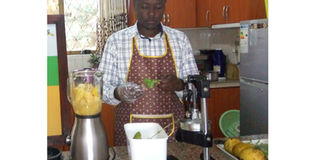Accountant quit bank to make juice

Peter Matovu makes pineapple juice. Before investing Shs400,000 to start his juice business, he took a nutritional and business course. Photo by Eronie Kamukama
What you need to know:
Peter Matovu is an accountant, turned entrepreneur, who quit his job to start a juice making company that would improve peoples’ lives, Christine Kasemiire writes.
The look of a freshly peeled mango is rarely forgotten. The smell and succulent juice dripping through your hands as you take a big bite from the sides is inviting to crowds. After, you drop the seed, wash your hands and move on.
But Mr Peter Matovu from Lungujja held onto the entire mango longer. The 32-year-old man had his life projection on land so flat, he could see the future. This was until last year when he decided to quit Citi Bank, a place he had worked for nine years. Having started from the bottom up, moving through ranks, the accountant was earning progressively well.
That is why the decision to drop the brown gorillas and red papers came as a shock to his wife, Genevive Kabarungi when he initially proposed to leave the bank and make juice.
“I started small, selling to people in office. But when I noticed the product was liked and had market, I discussed with my wife that I am making this move. It was not that easy but we agreed and knew which cards we both had and at the end of October, I left Citi bank and started managing Ivavi juice,” he says.
Together, they agreed that the move was worth exploring especially after she had heard the inspiration behind it.
Diagnosis of Matovu’s mother with liver sirosis along with the death of his spouse’s father inspired the young man to try and improve other people’s lives. The sad events bred a beauty – Ivavi juice, a combination of both him and his wife’s name.
Market
The detox programme is fancied mostly by those with interests in weight loss, cutting belly fat while parties indulge more in a freshly squeezed glass of cold sweet juice.
“Most of my clients are middle aged people, because most of my relationships have been within the same age bracket,” he says.
Matovu confesses that Ivavi is crawling to a marketing budget currently. Nonetheless, its quality speaks for itself. Indeed, people believe in what they can see.
Throughout the time he left his work in 2017, he has only got business because of referrals. More often than not, a previous client referred Ivavi juice to a friend who told a friend.
Matovu noticed that people believe in referrals.
“They quickly take on the detox programme because of referees, mostly by women with some men,” he says.
Referrals have given life to the business, which jumped from five office colleagues to 20 customers on a daily basis.
Challenge
Just like any other business dependent on temperature, weather is an obstacle to Ivavi juice. A breeze or rain will shift Ivavi’s loyal customers to hot tea or coffee, suitable for the weather they are experiencing.
Unfortunately, the scope of Matovu’s capital cannot allow for a much bigger spread to target the coffee and tea market.
Business competition from already established enterprises also holds up money for Matovu whose business is only at infancy.
The comparison between products is equally a bump on the road, especially when people want a replica of old products, and refuse to try new brands.
But he believes the market is still big and can accommodate all players. “Some ideas come up when people ask you to do something.
But I appreciate where I am, I am still in takeoff but next thing is for me to be ready for those big jobs,” he says.
Achieving the work-life balance is hard as Matovu sometimes endures working late nights to fulfill clients’ orders. The orders sometimes can go as high as 100 litres per function. This, he says proves strenuous to the body, yet to increase employees from five people who work on a temporary basis would mean bleeding out his baby business.
Future
Stemming from his experience at the bank, he learnt corporate governance, which ensured that he registers his business to tap into the international market, but not before he delves into local corporate organisations.
Sugarless juice recipe
First, squeeze 500ml of lemons. Then cut 500ml of pineapples (500ml capacity blender full of pineapples), wash and put a handful of mint leaves.
Then mix all things in a blender. After, sieve the pulp and retain fresh, clear, sweet and sugarless juice.
Building skills
Before he could inject Shs400,000 to start his juice business, he took a nutritional and business management course to equip him with the necessary skills.
The juice business, he says, does not need much start-up capital. The Shs400,000 was for a blender, fruits and mixer.
Matovu now makes fresh juice, detox programmes for those who want to lose weight plus special meals tailor-made to the subscription of doctors. The real gratification for Matovu is being an impact investor, one who makes profit while improving people’s lives.
Explaining the popularity of his products, Matovu says detox programmes have a rivalry business relationship in comparison to fresh juice which glide at the top of his popular products. Fresh juice, however, is popular with parties and merry making events.



